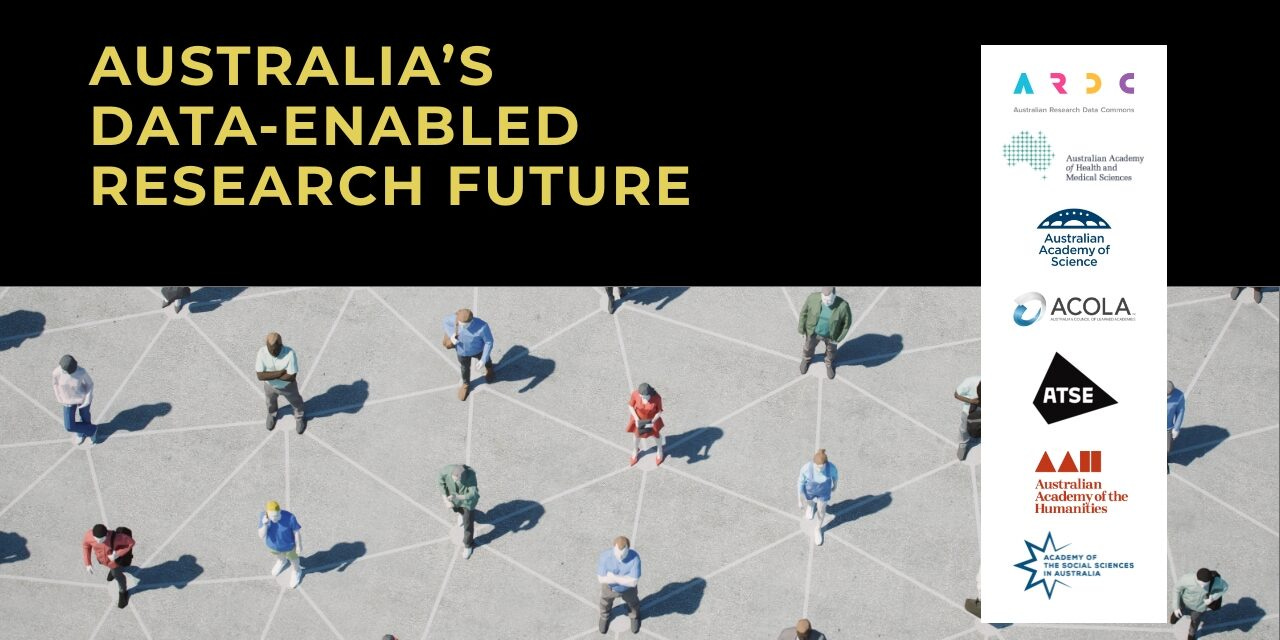June 2022 saw the release of five new reports on Australia’s Data Enabled Research Future [1–5], one from each of Australia’s five learned academies (AAHMS, AAH, AAS, ASSA, ATSE). The work, supported by the Australian Research Data Commons (ARDC) and the Australian Council of Learned Academies (ACOLA), includes a sixth synthesis and overview report by ACOLA itself [6].
The ACOLA overview report gives an easily digested 14 page synthesis of over 110 pages of academy reports. In essence, the synthesis can be further distilled into six key messages:
Data-enabled research is becoming more important across the board. The volume, complexity, centrality, and value of digital data, both quantitative and qualitative, is growing rapidly for members of all five academic communities.
Findable, accessible, interoperable, and reusable (FAIR) principles and open data play a vital role in a data-enabled research future. FAIR-ness and openness are self-evident prerequisites for realising the potential value of data through research advances.
The special status of Indigenous data and contributions of Indigenous researchers are also central to a successful data-enabled research future. FAIR, alone, is not enough. CARE principles (collective benefit, authority to control, responsibility, and ethics) are essential to transitioning to a society where data pertaining to Aboriginal and Torres Strait Islander people is seen by First Nations researchers as assisting rather than obstructing Indigenous goals.
The growing importance of data-enabled research demands new skills and training for researchers. Support for increased digital literacy is needed by researchers across all fields, no matter what the current baseline skill level is in different research academies.
Public investment is needed to establish sustainable platforms for archiving, managing, and sharing research data, whether generated by small research projects or major national initiatives.
Achieving these priorities depends upon effective policies and governance for data-enabled research. That governance needs coordination at the national level including leadership from learned academies, research funding agencies, and the Australian Government.
Digging deeper
While the ACOLA summary captures the headline priorities, the detailed individual academy reports each reveal further depth and nuance that underpins the broader messages. So here’s my take on the six most interesting, surprising, and revealing of those underpinning messages I found between the covers of the individual academy reports.
It’s not only about data
Most of the reports understandably centre on data as the primary focus of data-enabled research (see message 1 above). However, it’s not all about data. The tools, software, workflows, and code used to analyse data are often critical to the transparency and integrity of data-enabled research. Sometimes they are even the primary focus of the research itself. The report from the social sciences academy, ASSA [4], is most perspicuous of all the five academy reports in highlighting the importance of both data and computing technology. (Perhaps surprisingly in the context of other reports from traditionally more technology-focused societies such as ATSE and AAS).
Look out for “linked data”
The topic of “linked data” is concerned with structuring data in a way that makes it easier to answer more meaningful, more human questions. Linked data is enabled by set of artificial intelligence technologies that have emerged over the past 15 years, known as the Semantic Web (see also an earlier Hat Cupboard post on “The rise and rise of AI“). Linked data offers significant benefits when attempting to find, access, and use information spread across different data sources (see message 2 above). It is not entirely clear if the authors AAHMS and ASSA reports [1,4], which make most mention of linked data, were aware of the full import of wider adoption of this technology. Nevertheless, linked data has huge potential to support research, especially by accelerating research progress across discipline boundaries and within interdisciplinary research teams.
Data-enabled research needs a social license
The report by the AAHMS [1] highlights the implications of earning and retaining the trust of society in any research that uses data about people. In the context of data-enabled research, the social license required is the informal permission of the public to use potentially sensitive data from individuals in the pursuit of public good. The history of treatment of data about Aboriginal and Torres Straight Islander peoples (message 3 above) provides a salutary example of the lasting damage that can be caused by the misuse and abuse of data about disempowered members of society by empowered authorities.
Data is driving methodological change in research
The ACOLA summary highlights the need for training to grow the data-literacy skills-base of researchers across all disciplines (message 4 above). The ASSA report [4] goes further, pointing to the methodological impacts of data-enabled research. Traditional qualitative methods in the social sciences are being disrupted by the opportunities for new insights from big data sources, such as social media, and analytics tools, such as AI. Similar disruptions to traditional research methodologies are echoed in each learned academy’s report.
Researcher careers and incentives matter
Investment in sustainable infrastructure for data (message 5 above) is not enough to ensure data-enabled research is sustained. Sharing and opening access to data requires researchers’ time and expertise. The AAS and ASSA reports in particular [3,4] highlight the need to align research incentives and support researchers’ careers in recognition of the effort required to create and curate FAIR and open data. For example, incentives might include the use of metrics for data and software sharing in hiring, promotion, and funding schemes.
Don’t forget industry partnerships
All six reports underline the role of Government, national bodies, the academies, and universities working together in creating the policy and governance framework needed for data-enabled research to reach its potential (message 6 above). However, industry too is integral to success, a point particularly highlighted in the ATSE and AAH reports. Industry already invests significant effort into coordination, for example, through data standards and guidelines. But ultimately the positive impacts of data-enabled research and digital transformation in society will only come through partnership with industry.
References
[1] Australian Academy of Health and Medical Sciences (2022) Australia's Data-Enabled Research Future: Health and Medical Sciences.
[2] Australian Academy of the Humanities (2022) Australia's Data-Enabled Research Future: Humanities.
[3] Australian Academy of Science (2022). Australia’s data-enabled research future: Science.
[4] Academy of the Social Sciences in Australia (2022) Australia's Data Enabled Research Future: The Social Sciences.
[5] Australian Academy of Technological Sciences & Engineering (2022) Australia’s Data-Enabled Research Future: Technology & Engineering.
[6] Australian Council of Learned Academies (2022), Australia’s Data-Enabled Research Future: Synthesis Report.













